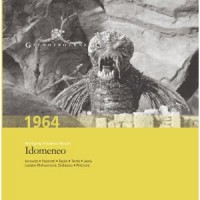Idomeneo is one of those operas I always meant to get around to, but never did. Composed in 1780, it’s considered Mozart’s first “mature” opera. If you collect live recordings of significant debuts, this 1964 Glyndebourne Festival live recording
might be of interest. So far as I can tell, this may be the first full recording of an opera with a young Luciano Pavarotti. He would tackle the title role later, notably in a production at the Met in 1982, to great effect, but on this recording he sings Idamente.
The Welsh tenor Richard Lewis takes on Idomeneo. He was approximately 50 years old on this recording and his voice is beginning to show it. He sometimes sounds as if Mozart’s phrases are one note longer than he has breath for. During “Vedrommi intorno l’ombra dolente,” he strains noticeably at the top. This being a live recording, by the time Lewis gets to Idomeneo’s final arietta “Torna la pace alcore,” he sounds tired. Some time with a good Italian diction coach wouldn’t have hurt, either.
In the distaff roles, Gundula Janowitz as Ilia and Enriqueta Tarrés as Elettra both, at times, sound shrill and pinched at the top of their range. This could be a factor of the age and technology of the recording (more on that later.) However, one delivers a well-sung and thoughtful performance, and the other….well, oh dear.
Janowitz sings with grace and a lovely tone through most of her range, starting with Ilia’s opening aria “Padre, germani, addio!” She is particularly affecting in “Se il padre perdei,” with great control and lovely flute-like pianissimi at the top. Tarrés is much less successful: the top notes in the Act I aria “Tutte nel cor vi sento” give her trouble: they sound forced and she scoops up to them. Elettra’s second act aria “Idol mio, se ritroso” is poorly sung. The sound is spread and unfocused even in the mid-range, and as Randy Jackson might say, “Dog, it was a little pitchy.” And by a little, I mean very.
Pavarotti, who must have been about 29 at the time, demonstrates the crystal clear tone and limpid sound that justly made him one of the leading tenors of his generation. Here, his style is direct and forthright and it was as if I was hearing him for the first time. In fact, he sounds a bit cold and dispassionate, but that could be because I’ve become used to the slightly over-the-top Italianate affectations he developed later in his career. Nevertheless, that unmistakable Pavarotti sound is there in spades. The highlight of the recording is the Act II trio, “Pria di partire, oh Dio!” which is beautifully sung by Pavarotti and Janowitz. (Lewis is less successful.)
John Pritchard obviously understands how to conduct Mozart and elicits a sprightly and vigorous performance from the orchestra. The overture was a particular delight.
I must give the caveat that all of my criticism is influenced by the poor sound of this recording. Digital enhancement can greatly improve older recordings, but in this case, the source material was recorded with, I suspect, a very narrow tonal range, even for 1964. (It sounds like it might have been recorded sometime in the late 40’s.) Since so little of the original dynamic range was captured accurately, there’s not much to work with here. Bass tones are muffled and whatever digital enhancement there is helps little. The high end of the sound is tinny, and the overall quality is compressed. I suspect this greatly contributes to Janowitz’s squealy top notes, as the violins also sound grating in their upper register. If you’re going to convert these CDs to digital audio files, you’re definitely going to want to pick a lossless format like FLAC or ALAC/Apple Lossless.
If you’re collecting, say, debut recordings of great singers, or the complete oeuvre of Pavarotti, then you might want this. (You probably own the bootleg of this anyway. I haven’t heard that bootleg, but this recording probably doesn’t improve on it much.) A good deal of care went into the production of this CD. The recording comes beautifully packaged as a mini hardcover book, with the libretto in English, Italian, German and French, notes, and production and costume photos from the production staged by Fritz Busch and Carl Ebert, with designs by Oliver Messel. The CDs themselves even come in precious little CD shaped “condoms!”



